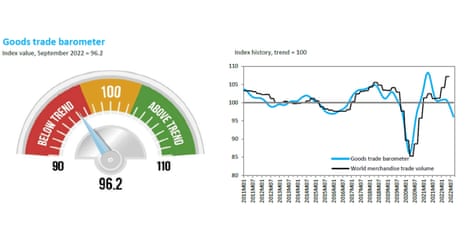World trade slowing as economy weakens; UK retail sales slump; BT pay deal reached – business live | Business

WTO: World trade is weakening
Global trade growth is slowing, as export orders weaken and demand for container shipments and air freight drops.
The goods barometer calculated by the World Trade Organisation has sunk below its trend levels, in another signal that the global economy is weakening.
It has slipped to 96.2, down from 100.0, reflecting cooling demand for traded goods.
The WTO fears that trade growth is likely to slow in the closing months of 2022 and into 2023, “as the global economy continues to be buffeted by strong headwinds”.
The report found falling export orders, and weaker demand for air freight and electronic components.
The WTO adds:
World merchandise trade volume growth continued to slow in the second quarter of 2022, with a 4.7% year‐on‐year increase similar to the 4.8% rise in the first quarter.
According to the WTO’s latest forecast, world trade is expected to decelerate further in the second half of 2022 and remain subdued in 2023 due to several related shocks, including the war in Ukraine, high energy prices, inflation, and monetary tightening in major economies.
Shipping giant Maersk warned at the start of this month that “freight rates have peaked” as global demand weakened.
Key events
Filters BETA
Afternoon summary
A quick recap of the main points.
Asia-Pacific markets have dropped as anti-Covid lockdown protests broke out at dozens of Chinese cities last weekend.
The demonstrations, as Covid-19 infections rise at record pace, have fuelled fears that China’s economic recovery could stumble.
Oil has hit its lowest level since January, while China’s yuan fell to a two-week low, as investor anxiety rose.
UK retailers have reported a drop in sales this month, and warned that December will be weak too, as the cost of living crisis hits the sector.
World trade growth has slowed, the WTO reports, another warning sign.
And the National Grid has backed away from triggering a power-saving plan to prevent blackouts tomorrow.
National Grid avoids triggering emergency blackout plan
Good news: National Grid no longer expects to activate its emergency winter plan tomorrow.
The UK electricity network operator has told the industry that “there is no longer considered to be a requirement for DFS” (its “demand flexibility service”).
That means households and businesses won’t be asked to cut their power demand tomorrow to avert power cuts.
UK National Grid **cancels** the need for its electricity-saving “Demand Flexibility Service” for tomorrow | #EnergyCrisis
— Javier Blas (@JavierBlas) November 28, 2022
As we reported earlier, the DFS is designed to reduce household consumption when supply is tight, by rewarding businesses and households that shift their power usage away from times of peak demand.
The plan to trigger the DFS has been cancelled, as the Grid now believes it has enough power to keep systems running.
This means households should be free to watch the World Cup, with England and Wales playing their final group game at 7pm GMT (other TV broadcasts are available, power permitting….)
BT and unions reach pay agreement
Peace is breaking out at BT, as the telco group announces a “UK Cost of Living Pay Rise” that could end strikes at the company.
BT is offering a £1,500 pay rise to all staff who earn less than £50,000 year.
The consolidated salary increase would be paid to all frontline BT staff, and 51% of managers in the UK.
When added to BT’s earlier pay increase, it means the lowest paid would receive a pay rise of over 15% this year.
Significantly, BT says that the CWU and Prospect unions will run consultative ballots recommending people vote in favour. If CWU members vote in favour, it would end the first national strike at BT in 35 years.
BT adds that its 2023 pay review has been moved to next September, and will take into account the January Cost of Living Pay Rise.
BT CEO Philip Jansen was in conciliatory mood, saying:
“This award is based on the principles we have followed throughout this difficult period. It gets help to as many of our colleagues as possible; favours our lower paid colleagues; and gives people the security of a built-in, pensionable increase to their pay.
“Crucially, it has been worked on in conjunction with the CWU. As I’ve said throughout, whatever our differences, our unions are vital partners.
We’ve today announced a cost of living pay rise that we’ve been working on with our union partners for all but our highest paid colleagues. Read about our approach here: https://t.co/5oyYQ6mOfu
— BT Group (@BTGroup) November 28, 2022

Wall Street has opened in the red, as the escalating anti-Covid lockdown protests in China fuel concerns over economic growth.
The S&P 500 index of US stocks has dropped by 0.7%, or 28 points, to 3,998 points.
Apple shares are down almost 2%, on reports that the disruption at its China factory could create a production shortfall of around six million iPhone Pros
Joshua Raymond, director at online investment platform XTB.com says the protests in China are worrying investors, for two reasons:
First, they are likely to be met with stricter rules and measures to curtail the length and spread of protests which might mean further restrictions to activity and therefore demand.
Secondly, the unusually large and broad protests are signs of cracks appearing in Xi Jinping’s dominance, which can mean longer term instability.
Both factors create uncertainty in demand for commodities such as Oil and this is why we’ve seen investors start the week in ‘risk=off’ moods by selling stocks and moving investments into safer havens such as the Japanese Yen.”
Lagarde: Economic growth is slowing rapidly
The eurozone’s top central banker, Christine Lagarde, has warned that European growth is slowing rapidly.
But the ECB president also kept her options open as to the size and number of the ECB’s future interest rate hikes – saying the pace of tightening will depend on several variables.
She told the European Parliament that:
“How much further we need to go, and how fast we need to get there, will be based on our updated outlook, the persistence of the shocks, the reaction of wages and inflation expectations, and on our assessment of the transmission of our policy stance.”
Lagarde: The impact of Russia’s war in Ukraine has been felt around the world. Inflation has surged, prompting central banks to raise interest rates. Energy costs have been a key driver of euro area inflation, which is at its highest since the start of our monetary union.
— European Central Bank (@ecb) November 28, 2022
Lagarde: Economic growth is slowing rapidly. By reducing people’s real incomes and pushing up costs for firms, high inflation is dampening spending and production. Growth is expected to weaken further throughout the rest of this year and the beginning of next year. pic.twitter.com/JhVEtllJ69
— European Central Bank (@ecb) November 28, 2022
Business leaders in northern England have warned the Transport Secretary there is a “crisis on our rail network”.
Members of the Northern Powerhouse Partnership have written to Mark Harper warning that a “wave of cancellations is wreaking havoc on the Northern economy”.

Jasper Jolly
Rolls-Royce has said it has run an aircraft engine on hydrogen in what is thought to be a world first for the aviation industry, which is considering using the fuel to decarbonise air travel.
The FTSE 100 engineering company said the ground test was a “major step towards proving that hydrogen could be a zero-carbon aviation fuel of the future”, in a joint project with the airline easyJet.
The test took place outdoors at Boscombe Down, a British military facility in Wiltshire. It used a converted Rolls-Royce AE 2100-A regional aircraft engine that is generally used to power turboprop planes.
Turboprop engines are used to drive a propeller on slower-speed short-haul flights, rather than driving the fan required for faster speeds in jet engines. Building and maintaining jet engines is Rolls-Royce’s main business line.
Here’s the full story:
The WTO’s gloomy outlook will only add to the pessimism in markets.
After a grim 2022, investors fear 2023 could also be choppy as economies are dragged close to, or into, recession.
Almost half of respondents to the latest Bloomberg survey said a scenario where growth continues to slow while inflation remains elevated will dominate next year. The second most likely outcome is deflationary recession, which would be even worse for most financial assets pic.twitter.com/ljkBDvaVap
— Kasia Klimasinska (@kklimasinska) November 28, 2022
WTO: World trade is weakening
Global trade growth is slowing, as export orders weaken and demand for container shipments and air freight drops.
The goods barometer calculated by the World Trade Organisation has sunk below its trend levels, in another signal that the global economy is weakening.
It has slipped to 96.2, down from 100.0, reflecting cooling demand for traded goods.
The WTO fears that trade growth is likely to slow in the closing months of 2022 and into 2023, “as the global economy continues to be buffeted by strong headwinds”.

The report found falling export orders, and weaker demand for air freight and electronic components.
The WTO adds:
World merchandise trade volume growth continued to slow in the second quarter of 2022, with a 4.7% year‐on‐year increase similar to the 4.8% rise in the first quarter.
According to the WTO’s latest forecast, world trade is expected to decelerate further in the second half of 2022 and remain subdued in 2023 due to several related shocks, including the war in Ukraine, high energy prices, inflation, and monetary tightening in major economies.
Shipping giant Maersk warned at the start of this month that “freight rates have peaked” as global demand weakened.
The finance boss of car dealership giant Inchcape has quit, after his “personal behaviour” fell below expected standards.
Gijsbert de Zoeten, Inchcape’s chief financial officer, has voluntarily tendered his resignation, and will be standing down from the Board with immediate effect.
In a statement to the City, Inchcape explained:
This follows an incident at a recent event where, through a lapse in judgement, he displayed personal behaviour falling short of the high standards expected of the leadership of the Group.
Inchcape insisted that de Zoeten’s departure was unrelated to the company’s financial performance or strategic direction, including its acquisition of Derco, the largest automotive distributor in Latin America.
Savers will see the rate on a fixed-rate account jump from 1% to 5% from December, HSBC UK has announced.
The rate on HSBC’s Regular Saver account is fixed for 12 months from the time of opening the account, under the bank’s terms
But HSBC UK announced on Monday that from December 1, it will increase the rate from 1% to 5%, and the rise will apply automatically to existing accounts.
Interest accrued up to this date will be at the rate offered when the account was opened.
Tom Wolfenden, HSBC UK’s head of retail, said:
“The rate is fixed for the year from the time of opening, however at this time to help with the increased cost of living and to support those who currently have a Regular Saver open, we are increasing all current Regular Saver accounts to the new rate of 5% with effect from December 1.
“Customers do not need to do anything, it will be updated automatically.”
UK interest rates have risen from just 0.25% at the start of the year to 3%, but banks have been criticised for being slow to lift savings rates in response.
Lenders are also under fire for not cutting mortgage rates quickly after turmoil in the UK bond market eased, having moved swiftly to raise them when the panic began.
National Grid poised to start emergency winter plan as energy prices soar

Alex Lawson
The UK electricity network operator is poised to activate its emergency winter plan after energy prices rose amid falling temperatures and amid growing concern over power supplies, our energy correspondent Alex Lawson reports.
National Grid indicated that it could announce on Monday afternoon that it was issuing a requirement for consumers to use its new demand flexibility service from Tuesday, which rewards businesses and households that shift their power usage away from times of peak demand.
Energy specialists are concerned that Britain’s power systems could be threatened by lower temperatures, which increase demand; still weather reducing wind power and the slow return of a series of French nuclear reactors, which have been out of action due to maintenance.
The Met Office issued yellow bad weather warnings over the weekend and some forecasters have suggested cold weather over Russia could hit the UK next month, in an echo of the “beast from the east” snow storms which hit the UK in 2018.
Gas and electricity prices surged on Monday morning as a result of the cold snap and forecast of worse to come. The price of gas for next-day delivery rose to 260p, up from 153p when markets closed on Friday night.
Here’s the full story:
The CBI’s retail sales survey (see here) also highighted that shops have been hiking prices over the last year.
It found:
-
Selling prices rose extremely quickly in the year to November, at a pace just shy of the 37-year high recorded in the previous quarterly survey (+82% from +87% in August). Prices are expected to increase at a broadly similar pace next month (+81%).
-
Elsewhere, wholesale sales volumes fell considerably in the year to November (-18% from +3% in October), with a broadly similar pace of decline expected next month (-21%).
Motor retailers also reported a sharp fall in sales, with further declines feared in December.
UK retailers are cutting jobs and scaling back investment in response to mounting economic gloom, according to the Confederation of British Industry https://t.co/FNQ6HWGVFu
— Bloomberg (@business) November 28, 2022
UK property demand falls after mini-budget rocked markets.
Demand for UK houses has also weakened, after the disastrous mini-budget drove up mortgage costs.
Property website Zoopla has reported today that demand for U.K. residential properties nearly halved year-on-year in the four weeks to November 20th, with net sales down 28%.
People selling their homes have typically had to settle for below the asking price in recent weeks, according to Zoopla, which is predicting house prices will fall by about 5% next year.
Here’s the full story:
And here’s some reaction:
screenshot here from a bloomberg article (behind paywall), suggests if history is a guide, it might take several years for house prices to “bottom-out”. pic.twitter.com/nr9PlzQRE8
— Harry Hindsight (@Harry_Hindsight) November 28, 2022
Back in the markets…grain, wheat and soybean prices are falling on concerns that China’s Covid-19 outbreaks, and escalating protests, will hit its economic recovery.
Wheat is down 0.9% to its lowest level in around three months, while soybean prices are 0.4% lower, and corn is off 0.5%.
Matt Ammermann, StoneX commodity risk manage, explained:
“The news from China of more COVID cases and the unexpected protests against the government are weakening wheat, corn and soybeans today.
“There is concern in commodity markets both about the possible disruption in China from more anti-COVID measures and also the impact of protests.”
Strike news: Workers in seven train companies are to vote on whether they want to continue taking industrial action in a long-running dispute over jobs, pay and conditions.
The Transport Salaried Staffs’ Association (TSSA) is balloting more than 1,600 operational, station, control and management staff, for strike action and action short of strike.
Ballots will be held throughout December with results due just before Christmas.
The companies being re-balloted are Avanti West Coast, CrossCountry, East Midlands Railway, LNER, Northern, Southeastern and Transpennine Express (TPE).
National Grid could activate emergency winter plan to avoid blackouts
UK households might be paid to help Britain’s grid operator avoid a potential blackout on Tuesday evening, partly due to problems in the French energy grid and a drop in wind power.
National Grid’s electricity systems operator division said it is considering whether to activate a live run of its demand flexibility service for the first time on Tuesday.
The scheme, which launched at the start of this month, has already been tested twice in the last two weeks but has not yet been run for a live event.
National Grid said it would decide by around 2.30pm today whether to issue the notice to suppliers and households.
Electricity demand is rising as European temperatures fall, while weak wind speeds are hitting renewable energy supplies.
As I said earlier, while oil plunges, do keep an eye on European electricity markets (UK and France).
Despite seasonally mild weather, the lack of wind is forcing a high gas burn, sending day-ahead wholesale baseload prices pretty high, and peakload even higher | #EnergyCrisis pic.twitter.com/rd2wXlhzVu
— Javier Blas (@JavierBlas) November 28, 2022
UK wholesale power prices for tomorrow evening (5-6pm) will be very, very high at ~£1,100 per MWh. That’s the 15th highest ever price for an evening since 2010.
National Grid ESO is flagging it may activate for tomorrow its new Demand Flexibility Service to balance the market.
— Javier Blas (@JavierBlas) November 28, 2022
https://www.theguardian.com/business/live/2022/nov/28/oil-stocks-slide-china-protests-markets-business-live World trade slowing as economy weakens; UK retail sales slump; BT pay deal reached – business live | Business



